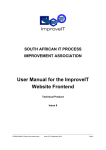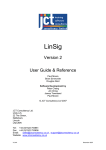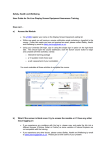Download A User's Guide to the Additional Support Needs Tribunals for Scotland
Transcript
A USER’S GUIDE TO THE ADDITIONAL SUPPORT NEEDS TRIBUNALS FOR SCOTLAND 1. INTRODUCTION This guide is designed to help everyone who has an interest in the Tribunals. If you are a young person with additional support needs or a parent of a child with additional support needs, this guide should help you decide whether the Tribunals can help with your dispute. If you work for an Education Authority or you have been asked to appear as a witness, this guide should also help you understand what the tribunal process involves. The guide aims to give users an overview of what issues the Tribunals deal with and what should happen when a reference (appeal) is received. If you would prefer, we can send you this guide in printed format. As well as reading this, you may find it helpful to watch our introductory DVD (10 minutes) and again we can send you a DVD if it is easier for you. For a printed guide or DVD, or if you have unanswered questions, please call our helpline on 0845 120 2906. 1 2. WHO WE ARE The Education (Additional Support for Learning) (Scotland) Act 2004 introduced far-reaching changes aimed at improving provision for children and young people who have additional support needs and face the biggest barriers to learning. This Act established the Tribunals on 14 November 2005 to provide a way to resolve certain disputes between parents or young people and the Education Authority. The Tribunals are independent of the Scottish Government and the Education Authorities and will deal with references fairly and justly according to the statutory provisions. Each Tribunal is chaired by a convener who is legally qualified and is supported by two members who have expertise in additional support needs. The Tribunal will aim to ensure that proceedings are as informal and flexible as possible. In practice parties can choose to come to the Tribunal without a representative, be represented by someone who is not legally qualified or be represented by someone who is legally qualified. Whatever choice parties make about representation, the Tribunals will exercise their enabling role to try to ensure that no-one is at a disadvantage. 2 3. WHAT WE DEAL WITH Children and young people who have complex and enduring needs which require significant input from a body other than the Education Authority should receive a Co-ordinated Support Plan to ensure their needs are met. The Tribunals can deal with disputes about the opening or the content of Co-ordinated Support Plans and in certain circumstances, can deal with refusal of a placing request. The following pages contain the issues a Tribunal can consider. The legislation which sets out what the Tribunals can consider is found in the Education (Additional Support for Learning) (Scotland) Act 2004 at section 18. 3 Assessment: x Where a parent has asked the Education Authority to assess if the child has additional support needs which would require a Co-ordinated Support Plan, but has not had a reply (section 18 (5) - deemed refusal). x Where the Education Authority has said that the child needs a Co-ordinated Support Plan but the parent has not received it within the time allowed (section 18 (3) failure to complete within timescales - normally 16 weeks). The Need for a Co-ordinated Support Plan: x The Education Authority has told the parent that their child needs a Co-ordinated Support Plan and the parent does not agree (section 18 (3)(a)(i)). x The Education Authority has told the parent that their child does not need a Co-ordinated Support Plan and the parent does not agree (section 18 (3)(b)(ii)). 4 The Contents of the Co-ordinated Support Plan: Where the parent disagrees with what the Education Authority has written or has omitted in their child’s Co-ordinated Support Plan about: x the factors from which the child’s additional support needs arise; x the educational objectives that have been set taking account of these factors; x the type of support proposed to help the child meet these objectives; x the person or agency who will provide that support (section 18 (3)(d)(i)). Reviewing the Co-ordinated Support Plan: Where: x the Education Authority has reviewed the child’s Co-ordinated Support Plan and decided the plan is still required and the parent does not agree (section 18 3(a)(ii)); x the Education Authority has reviewed the child’s Co-ordinated Support Plan and decided a plan is no longer required and the parent does not agree (section 18 (3)(b)(ii)); x it has been more than 12 months since the child’s 5 Co-ordinated Support Plan was opened/reviewed and the Education Authority has not started to review it (section 18 (3)(d)(ii)); x the Education Authority had started to review the child’s Co-ordinated Support Plan but had not completed that review within the timescales allowed, normally 12 weeks, (section 18 (3)(d)(iii)); x the authority refuses a request for a review where it has been less than 12 months since the child’s Co-ordinated Support Plan was reviewed but the parent has written informing the authority that there has been a significant change in the child’s additional support needs (section 18 (3)(d)(iv)). 6 Placing Requests: Where: x the Education Authority has written to the parent refusing the placing request; OR x the parent made a placing request and has not had a decision (this is only valid within a specified time frame1). AND on that date (or the deemed refusal date1) one of the following applied: x a Co-ordinated Support Plan was in place for the child; x the Education Authority has decided that the child needs a Co-ordinated Support Plan and is in the process of preparing one; x there is a reference to ASNTS about the Education Authority’s refusal to open a Co-ordinated Support Plan (section 18 (4)). 1If a placing request is made after 15 March for the child to start at a specified school on the first day of term in the next school year AND a decision is not received by 30 April, that placing request is ‘deemed’ to have been refused. For a placing request at any other point in the school year, if a decision is not received within 2 months of a placing request, it is deemed to have been refused. (The Additional Support for Learning (Placing Requests and Deemed Decisions) (Scotland) Regulations 2005, Regulation 4). 7 4. WHO CAN MAKE A REFERENCE/APPEAL The Tribunals can consider a reference from a parent of a child with additional support needs. ‘Parent’ is defined in the Education (Scotland) Act 1980 as being anyone with parental responsibility. This definition includes guardians, anyone who is liable to maintain and anyone who has parental responsibilities. Please remember that when we mention ‘parent’ in this guide, this definition applies. When we mention ‘child’ we are also referring to ‘young person’. A ‘young person’ (aged 16 or 17) can make his/her own reference to the Tribunals. Where the young person ‘lacks capacity’, the parent can make the reference on their behalf (section 3). 8 5. WHAT’S INVOLVED A parent or young person who wishes to make a reference may complete the reference form which sets out all the information necessary for a valid reference. We can send a paper copy but if the individual has internet access, a form can be completed and sent online - Reference Form. The law requires that this form is signed by the appellant; therefore we will print what has been submitted and send it back to you for signature. If you have indicated that there is a representative acting for you then we will still need your signature but thereafter all our correspondence will be with them. It is very helpful to include as much information as possible with the reference form. Documents such as reports, correspondence with the Education Authority or Co-ordinated Support Plans, will help to indicate if the reference is competent. If the Tribunal can deal with the dispute raised in the reference, we will copy the reference form and any accompanying documents, send them to the Education Authority and invite them to respond. If the information in the reference form is detailed, the authority will be able to make an informed response and will have no need to duplicate the documents already sent by the parent. 9 The parent or young person and the Education Authority have 30 working days (no less than 6 weeks) to consider if there are further documents they wish to include or if they want to send in a statement of their arguments known as a case statement. There is no requirement to produce a case statement; indeed, the parent may have submitted all the relevant information with the reference. There is a requirement for the Education Authority to respond otherwise they are not entitled to take part in any of the proceedings (The Additional Support Needs Tribunals for Scotland (Practice and Procedure) Rules 2006, rule 10(4)). During this period, parties, that is the ‘parent’ and the ‘Education Authority’, should consider who they may want to bring as a witness. The President has prepared guidance for witnesses which will help each party decide who it would be important to bring. Each party is entitled to have two witnesses; exceptionally, on written request, the convener may give permission for additional witnesses. The parties themselves may also give evidence. The fact that a reference is proceeding does not mean that the parties should no longer try to reach an agreement. The Tribunals encourage parties to try and reach agreement prior to the hearing if this is possible. The convener will normally wish to hold a 10 telephone conference call close to the hearing date to discuss how the hearing will proceed, confirm what witnesses are to be called and to agree a running order. It is also an opportunity for parties to clarify any preliminary issues in advance of the hearing. No special equipment is needed for the conference call. 11 6. HEARING When possible, the date of the hearing is allocated at the outset; it will only be changed in very exceptional circumstances. If there is an insurmountable difficulty with the date that has been set, parties should inform the Secretary immediately stating the reason why this date is unsuitable. Otherwise, as substantial notice is given, parties are asked to keep the date or dates as allocated. When the date for the hearing is allocated, parties should consider if they wish to call witnesses and whether those witnesses will be available to attend. It is possible for a witness to give written evidence or to speak to the Tribunal by telephone conference call if personal attendance is not possible. A reluctant witness or a witness who may experience difficulty getting time away from work to attend, may be cited to attend by the Tribunal. The Tribunals hold hearings in private. For that reason, witnesses will normally be in the hearing room only when they are giving their evidence; they will not be allowed to observe either before or after this period. A waiting room with refreshments is provided and the Case Officer will come for the witness when the Tribunal is ready and will keep them updated if there is any delay. Parties should ensure that prospective witnesses are given a copy of the President’s guidance as this explains how hearings are normally conducted. 12 The Tribunal welcomes the opportunity to hear from the child but the decision as to whether the child attends is entirely for the parent. To make it easier for the child to attend, the Tribunal can hear from the child in a smaller, less formal room at a pre-arranged time. The Parent can bring a professional along to help the child put his views across; again, the parent is best placed to judge what is appropriate. The Secretariat can provide contacts for skilled advocacy workers to enable this process. There will be no cost to you. If the parent decides that it would be inappropriate for the child to attend, the Tribunal would welcome hearing the child's views in an alternative format. For instance, in writing or a short audio or video recording. The hearing itself is recorded on an unobtrusive audio device and the recording is held for a restricted period. This record will be released to parties in the event of an appeal to the Court of Session and in other circumstances following approval of the President. A request for release of the audio recording should be made in writing to the Secretary and should set out reasons for seeking the release. The Tribunal has no facilities to provide a transcript of the hearing. 13 No two hearings are alike but most last at least a full day and the more complex hearings (such as placing requests) can take several days. The conveners will try to make the proceedings structured so that parties know what to expect but there will always be scope for flexibility. In such sensitive matters, an understood format can reassure parties about what to expect and how the case will proceed. The Tribunal will also try to ensure that there are short comfort breaks during the morning and afternoon sessions. The hearings are held in a variety of venues across Scotland including; meeting rooms in business centres and universities/ colleges, tribunal suites, hotels and even in local authority accommodation where parties consent. Selection of the venue is important for the ambience of the hearing but also to ensure that it is private and convenient for parties. Each party will have a private waiting room where tea and coffee will be available on arrival and at breaks in the hearing. A sandwich lunch will also be provided. Providing this service helps the Tribunal to keep breaks short and to make the best use of the time available. 14 7. REPRESENTATIVES Parents will often be unfamiliar with the Tribunal process and may want someone to represent them at the hearing. This could be a family member, friend, someone from a representative organisation or someone with a legal qualification. If a parent decides to have a representative this should be confirmed in writing and all communication from the Tribunals will only be sent to that named representative. Similarly, the Education Authority can be represented, like the parent, and may instruct who it wishes to present its case. Again, the Education Authority should advise us in writing who will be presenting its case. Either party can choose to have a representative or change a representative at any point prior to the hearing but it is important that the party informs the Secretary in writing without delay. Where the reference is unopposed or both parties choose not to attend there will be no notified hearing but the Tribunal will deliberate and a decision will be issued. 15 8. DECISION Depending on the complexity of the issues under consideration, the convener might be able to give a verbal decision at the end of the hearing, if the parties so wish. It might be that parties reach an agreement in the course of the hearing or the Tribunal can deliberate the issue within a relatively short time. In all cases parties will receive a written decision which is usually issued within 2 weeks of the hearing. 16 9. HELP AND SUPPORT Submitting a reference does not mark the end of discussion between the parties; both parties should continue to seek to reach an agreement wherever possible. The Act requires authorities to make mediation services available without charge. If parties take up this service, a hearing may prove unnecessary or they may find that some disputed issues are resolved and the hearing becomes more focussed. Enquire, the national advice body for additional support needs, may be able to provide details of support groups in the parent’s area or those which specialise in the specific area where the child’s support needs lie. There are number of organisations which can assist parents to prepare for a Tribunal or even attend as their representative. For more information contact Enquire. 17 The hearing will be scheduled no earlier than 10 ‘working days’ (at least 2 weeks) after the case statement period ends. Hearings about Co-ordinated Support Plans are generally allocated 1 or 2 days but where the hearing is about a placing request refusal, it is likely to take longer. As it gets nearer to the hearing, it may become clear that the number of days we have allocated for the hearing will not be sufficient; for instance, the Tribunal might agree to hear evidence from an additional witness. Whatever the reason, if it becomes clear that additional dates are required, these will be agreed as soon as possible. 18 The Tribunal staff can advise and answer questions about the process but it is not appropriate for them to advise parties how they should present their case or give a view on the outcome of a reference. If you have an enquiry about the process, please call our helpline on 0845 120 2906. There is a database of anonymised decisions on our website - Decisions Database. This should provide information about the range and type of issues which have come before the Tribunal and the type of evidence which is usually considered. 19 10. HOW LONG DOES IT TAKE? The time from submitting a reference to receiving a decision varies considerably. The Tribunals focus on the best interests of the child to avoid any unnecessary delay. To this end we aim to register a reference within 2 days of receipt provided we have all the information which the law states is necessary, but some references may take longer where there are issues of competence, time limits or missing documents. We will set a date or dates for the hearing as near to the start of the process as we can. This means that parties know how long they have to prepare their case and notify witnesses. It gives the maximum amount of notice of the hearing to minimise the incidence of cancelled dates. The law provides 30 ‘working days’ (at least 6 weeks; weekends, certain holidays and the month of July do not count as working days) for the parent/young person to prepare a case statement but this period can be shortened where the reference concerns or is linked to a placing request refusal and may be lengthened if there are grounds to do so (The Additional Support Needs Tribunals for Scotland (Practice and Procedure) rule 8). 20 11. AFTER THE TRIBUNAL Parents can claim reasonable travel expenses for their attendance at the hearing, for the child if he/she attends, for an individual brought to the hearing to look after the child,. Their witnesses and their representative can also claim (provided the representative cannot obtain travel costs from another source). We cannot pay travel expenses for the Education Authority or anyone attending in connection with their response - Expenses Guidance and Claim Form. Both parties will be sent a copy of the written decision . There is a statutory obligation on the President to publish Tribunal decisions. In the interests of transparency, the President has directed that all decisions following an oral hearing will be published. To protect the privacy of parties and witnesses, identifying features are removed and the decision anonymised. The decision is normally published on the website 3 months after it has been issued. Parties are sent a copy of the anonymised decision and can make representations to the Secretary if they are of the view that the decision, or any part of it, should not be published. In the event of any appeal to the Court of Session there will be a note placed with the decision to the effect that it has been subject to appeal and the outcome, if available, will be indicated - Decisions Database. 21 12. WHAT OUTCOMES CAN THERE BE? The reference may be allowed and the decision will set out what requires to be done in consequence and the date by which it must be done. OR The Education Authority’s original decision may be confirmed. OR The reference may be withdrawn or dismissed. Very often the parties continue to discuss what is in dispute right up to the day of the hearing. If these discussions lead to agreement, the parent may withdraw the reference by writing to the Secretary. In such circumstances, we would send a copy of the withdrawal to the Education Authority and the convener would make an order dismissing the reference. Additionally, if at any point prior to the hearing, it is established that the reference was not made in accordance with the Rules which set out how the Tribunals function or if it is found that the reference is not within the jurisdiction of the Tribunal, the convener may make an order dismissing the reference. Before making such an order, the convener will invite and consider any representation made by the parties. 22 13. ANY FURTHER APPEAL RIGHTS There is no provision for the Tribunal to review the substance of its own decision; the convener can only correct clerical mistakes or omissions on the decision document. Any further appeal must be to the Court of Session. A party cannot appeal simply on the grounds that it does not agree with the outcome; an error of law must be identified. This is usually where the Tribunal has not correctly applied the law or has not explained its decision adequately. 23 14. WHERE CAN I GET MORE INFORMATION? This guide provides a simple introduction. If you have unanswered questions about the process, please contact us. The Additional Support Needs Tribunals for Scotland Europa Building 450 Argyle Street Glasgow G2 8LG Email: [email protected] Helpline: 0845 120 2906 (charged at local rate) 24





































